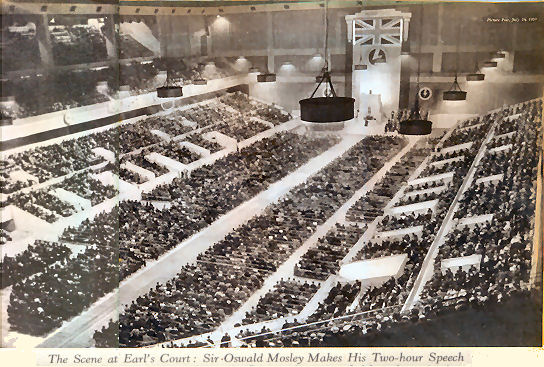fascist
meeting, earl’s court, london 1939
From Picture Post, July 29, 1939
British Fascists complain that their movement is ignored
in the Press. Requests and challenges to attend a meeting
came into our office. We decided to send a cameraman and
journalist to make a completely objective record of the
big Fascist meeting at Earl's Court.
WHEN we agreed to report the Fascist meeting at Earl's
Court on July 16, we wrote to the British Union explaining
what we wanted to do. We said we wished to present a completely
unbiased report, both in our pictures and article, and
for this reason we put nine questions for the British
Union to answer. These are the questions, and the answers
as received from the Union's Director-General :-
series
of written answers from the british union to the picture
post
QUESTION: What is your membership ?
ANSWER: On the foundation of our Movement
it was stated that the total number of our membership
would never be published. We have always adhered to this.
QUESTION: What pledges or undertakings are given by
your members on joining? What is the subscription for
members ?
ANSWER : The following undertaking
is given by members on joining: "I, the undersigned,
being a British Citizen, loyal to King and Empire, hereby
enrol as a Member of the British Union. I accept the principles
and constitution of the British Union and will be loyal
to its Leadership." Subscriptions for active members
are a minimum of 1s. a month if employed, 4d. a month if unemployed. For inactive
members a minimum of 1d. a week, 4d. a month.
QUESTION: Do your members go through any form of physical
training or drilling? If so, why?
ANSWER: Drilling is forbidden. It is
prohibited by the Public Order Act. Our members are encouraged
to keep fit by all forms of athletics.
QUESTION: How does the British Union contemplate getting
into power?
ANSWER: As stated in our-Constitution
and Rules, "The object of the British Union is to
win power by vote of the people at a General Election."
QUESTION:: What are its immediate objectives on getting
I into power?
ANSWER: Policy described in the Leader's
book, "Tomorrow
We Live."[.pdf]
QUESTION: Does your Party intend to contest seats at
the next General Election. If so, how many ? What are
they, and who are the candidates?
ANSWER : Yes, some seats will certainly
be fought. The number will depend entirely upon the amount
of money that can be raised. The final announcement will
not be made until later.
QUESTION: Why did you stop calling the party Fascist
?
ANSWER: "British Union" have
been the first two words in our name from the foundation
of the Movement; and for a long time past we have only
used these two words in the name. They are the two British
words which best describe our purpose. On the other hand,
we certainly do not deny that our creed is Fascist, vide
again Constitution and Rules, 1st two lines: "The
name of the Movement is the British Union and the faith
of the Movement is the National Socialist and Fascist
creed."
We are, in this respect only, in precisely
the same position as the Labour Party. They are called
the Labour Party with the International Socialist creed;
we are called the British Union with the National Socialist,
or Fascist, creed. Our Movement and our name are purely
British. Our creed, on the other hand, is universal but,
being a national creed, in every country has a character,
policy, form, and method, suited to that country alone.
QUESTION: What are the contacts between the British
Union and the National Socialist Party of Germany, and
the Fascist Party of Italy?
ANSWER : Nil.[3] We are a National and not an International Movement and,
therefore, are not organised in any international manner.
Our only interest in foreign statesmen or foreign Movements
is to preserve friendship in order to establish peace.
QUESTION: Does your Party support the foreign as well
as the internal policy of Germany and Italy?
ANSWER: The suggestion that our Movement,
either in internal, or foreign, policy, has any foreign
model, is completely untrue. Our position in this matter
has been defined by the Leader in the Foreword of his
Book "Tomorrow We Live" (quotation given from
book).

report
of the meeting:
To cover the meeting at Earl's Court, we sent a reporter
who is not a member of any political party. This is his
story:-
This was the British Union's first big indoor meeting
in London for over three years. A blue-badged steward
told me that they budgeted for an audience of 30,000 people,
that everyone had to pay for tickets, and that with a
good deal of luck they might break even on the rally.
The Daily Mirror and the Daily Express reported next
day that a few minutes after the meeting had begun, officials
shouted "There are plenty of free seats," and
the crowds rushed in.
The News Chronicle said there were 20,000 people present.
The Daily Mirror said "about 10,000 convinced Blackshirts."
The Times said the hall, estimated to 30,000, was ''fairly
well-filled." [2]
The crowds were already flooding into their places at
six-thirty. I should say that they seemed to be a younger
than average crowd and—perhaps because they were wearing
Sunday suits—better dressed. In the first fifteen rows
(where the seats cost 10s. 6d.) there
were a few of the fashion-plate type of clubman. The proportion
of men to women seemed to be about two to one. I was told
that about 5,000 stewards were on hand.
By ten minutes past seven most of the crowd were in
their seats and community singing started. The hall was
arranged on a red, white and blue colour scheme with large
slogans such as "Britons Fight for Britain Only"
and "Unite for Peace and People." At the front
of the hall was a flight of white cloth-covered steps,
stretching from one side to the other, and in the middle
was a large pulpit about twenty feet high from which Sir
Oswald Mosley was to speak.
At seven-forty, action began. First came the Fascist
drum-and-fife band. This was followed in succession by
a man carrying a grimy Union Jack (used at the earliest
meetings), men (rather poorly dressed) carrying red, white
and blue Fascist banners, (drummer girls in blue and grey
(the girls on the outside edge being the more attractive),
men again in street clothes carrying black and yellow
Fascist banners, men carrying Fascist pennants, and, finally,
a man carrying a forked ecclesiastical-looking pennant.
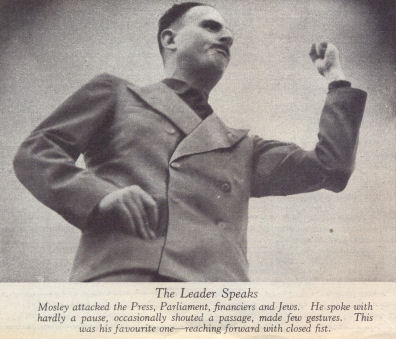
After a fanfare, Mosley walked the length of the hall.
He was dressed in a grey flannel suit. As he passed, you
noted the deep-set eyes, twinkling smile, short white
teeth, thick neck, well-pomaded black hair. The audience
cheered and most saluted.
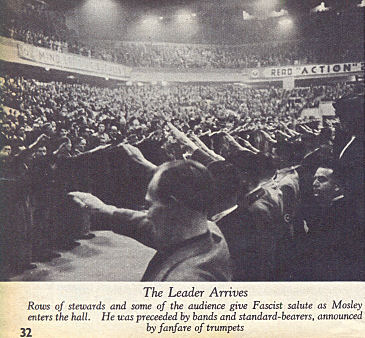
"Fellow Britons," said Mosley after he mounted
the rostrum, "to-night the British people are here."
The big meeting was on.
Most of the time I sat next to Mr. and Mrs. B—; B— is a civil engineer. "Don't mention my name, please,"
he asked. It was the first Fascist meeting he had been
to. He had paid ten shillings for his seats and had come
up from Carshalton.
"I have a great belief in Fascist things,"
he said. "Is there much Communism in Carshalton?"
I asked.
"No," he said, "but there is an invasion
of Jewish refugees and cut-price shops there. Terrible
it is. I've given up reading the papers altogether ....
You see, I've a certain flair for politics. This trade
cycle seems totally unnecessary to me. How can Germany
get rid of 6,000,000 unemployed and we not ... "
But the Leader was speaking. Mosley's voice, loud and
compelling, gradually ascended the register as each of
his sentences developed, rather in the manner of a car
speeding up to the next gear-change. His chief gesture
is a slow forward movement of the hand as of one who seeks
to score a double-twenty on the dart board. His voice
had its occasional hoarse breaks, but none of the rasp
of Hitler's; his hoarser passages were bayed rather than
shouted.
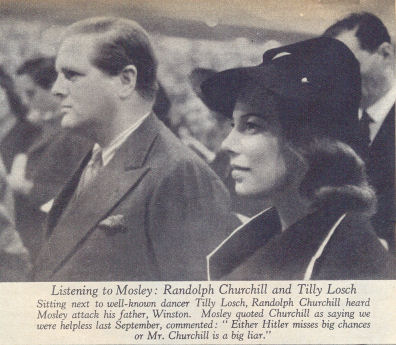
Of course, Churchill was correct and Mosley was merely
foolish, as usual.
In most cases the applause that he got appeared entirely
genuine, though once or twice it started before most of
the audience could have seen point of the remark he was
about to make.
Mosley's arguments were clearly put. He attacked the
Press because it ignored him. "According to the Press,
you don't exist at all," he told his audience. He
attacked the present political system because "it
divides the nation on issues that don't exist at all"
and the financiers because, he said, they control both
the Press and Parliament. He would like to make the British
Empire entirely self-sufficient . He would like to give
Hitler a free hand in Eastern Europe ("If anyone
can keep order there, good luck to them"), return
the Mandated Territories and call a disarmament conference.
He also referred to the Jewish forces working here 'to
bring about a world war.' At this point Mr. B— applauded
so vigorously that his hat fell to the ground. All through
the evening the anti-Jewish outbursts were the lines that
got the big applause.
Mosley ended his speech with a phrase bringing in "This
vow which we have made for to-night ... for to-morrow
... for ever." It sounded impressive, even if you
were not quite sure what vow you had taken. Then came
the anthem "Britain Awake" and the procession,
the band, the blue and grey girls, the men with the banners
and the pennant.
Finally the Leader himself followed them and went through
a door, next to some telephone kiosks, marked "Private."
The big meeting was over.
PICTURE POST has no Connection with any political party.
It believes in publishing the facts about all parties.
advertisement
mosley
understood the labour party and its close relationship
with fascism
Of course in the nineteen thirties,
everyone knew that National Socialism was just one variety
of socialism. After the war, socialists worked overtime
attempting to distance themselves from fascism/national-socialism
by propaganda and mis-information.
“We are, in this respect only, in precisely the
same position of the Labour Party. They are called the
Labour Party with the International Socialist creed;
we are called the British Union with the National Socialist,
or Fascist creed. Our Movement and our name are purely
British. Our creed, on the other hand, is universal
but, being a national creed, in every country has a
character, policy, form, and method, suited to that
country alone.”
[Written answer from Mosley’s British Union, July
1939]

“The National Socialist creed of British Union
says to our countrymen, ‘If you love our country
you are national, and if you love our people you are
socialist’.”
[Quoted from Tomorrow we live - British
Union Policy, 1938, the manifesto of the British Union
Party]
satirical responses to mosley
P.G. Wodehouse in The Code of
the Woosters, 1937—
“Roderick Spode is the founder and head of the
Saviours of Britain, a Fascist organization better known
as the Black Shorts.” [Mosley’s organisation
was the British
Union of Fascists, commonly known as the Black Shirts.]
“The moment I had set eyes on Spode, if you remember,
I had said to myself ‘What ho! A Dictator!’
and a Dictator he had proved to be. I couldn’t
have made a better shot, if I had been one of those
detectives who see a chap walking along the street and
deduce that he is a retired manufacturer of poppet valves
named Robinson with rheumatism in one arm, living in
Clapham.
‘Well, I’m dashed!
I thought he was something of that sort. That chin …
Those eyes… And, for the matter of that, that
moustache. By the way, when you say “shorts”,
you mean “shirts”, of course.’
‘No. By the time Spode
formed his association, there were no shirts left. He
and his adherents wear black shorts.’
‘Footer bags, you mean?’
‘Yes.’
‘How perfectly foul.’
‘Yes.’
‘Bare knees?’
‘Bare knees.’
‘Golly!’
‘Yes.’ [Chapter
3]

“He was, as I had already been able to perceive,
a breath-taking cove. About seven feet in height, and
swathed in a plaid ulster which made him look about
six feet across, he caught the eye and arrested it.
It was as if Nature had intended to make a gorilla,
and had changed its mind at the last moment.
““But it wasn't merely the sheer expanse
of the bird that impressed. Close to, what you noticed
more was his face, which was square and powerful and
slightly moustached towards the centre. His gaze was
keen and piercing. I don't know if you have even seen
those pictures in the papers of Dictators with tilted
chins and blazing eyes, inflaming the populace with
fiery words on the occasion of the opening of a skittle
alley, but that was what he reminded me of.” [Chapter
1]

“The trouble with you, Spode, is that just because
you have succeeded in inducing a handful of half-wits
to disfigure the London scene by going about in black
shorts, you think you're someone. You hear them shouting
"Heil, Spode!" and you imagine it is the Voice
of the People. That is where you make your bloomer.
What the Voice of the People is saying is: "Look
at that frightful ass Spode swanking about in footer
bags! Did you ever in your puff see such a perfect perisher?"
” [Chapter 7]

Also, Nancy Mitford, in Wigs on
the Green, where the British
Union of Fascists became the Union Jack Movement,
and the Black Shirts became the Union Jack Shirts. Wigs
on the Green also satirised her sister Unity.
This satirical work was not taken well by the Mitford
family (aggravated by Unity’s
attempted suicide), and Nancy Mitford and her family
ever afterwards worked to ‘bury’ it. Therefore,
as a result of this behaviour, Wigs on the Green had become virtually a banned book since its publication
in 1935. This is a shame, because it forms an interesting,
minor social document of those times. It is now close
to unobtainable. Update,
at last, 2010: reprints are now available.
“Oh, good”, she
said, coming down from her tub. She
then began hitching up her skirt, disclosing underneath
it a pair of riding breeches, from the pocket of which
she produced two recruiting cards and a fountain pen.
“You sign here—see? You have to promise
that you will obey the Captain in all things and pay
ninepence.”
“I promise,” said
Jasper.
“It’s all very well,”
said Noel, “I suppose that’s O.K., but look
here, who is the Captain? Is he a nice chap? Couldn’t
I promise in most things? He might want me to do something
very peculiar, mightn’t he?”
“Eugenia looked at him
with a lowering brow, fingering her dagger. “You’d
better be careful,” she said gloomily. “That
is no way to speak of the Captain.”
“I’m awfully sorry,”
said Noel, nervously eyeing the weapon. “I’ll
never do it again. Right then, here’s my ninepence.”
Nancy Mitford, Wigs on the Green, 1935
Thornton Butterworth, Ltd, p.22.
after
world war two
Even after the war, Mosley’s
superficial theories and vaunting ambitions remain. Like
Napoleon and Hitler,
he dreamed of European empire and subservient markets
and resource supplies.
“Ourselves Alone” [Sinn
Fein!]
“With or without American assistance, we Europeans
can do it: if necessary with the motto "ourselves
alone." Bring two hundred and seventy million people,
whose fathers have produced every great invention of
the world, into direct contact with the most extensive
natural resources of the world which are to be found
in Africa. Can anyone deny that the result will be the
highest civilisation the world has yet seen; once Europeans
have won the will to unite and to act? Yes, it is true
that Britain has lost financial resources, man power
and all the old means to save herself. But Britain in
Europe and with Europe can provide and share with all
Europeans more skilled man power and more resources
and strength than any of us ever dreamt of having before.
United we stand, divided we fall. Workers of Europe
unite, you have nothing to lose but - the racket.”
[From The ABC of modern economics, Mosley,
1951]
Along with the usual contradictory
and romantic notions of ‘economics’, so beloved
within socialism,
you may read a
sample here if you can stand the turgid shallows.
Here is a tedious sample to whet your appetite:
“4. The method of industrial organisation will
be a dynamic pragmatism. We shall experiment, find out
what works, change a method quickly if it does not work,
and follow success with every energy. We will be bound
by no preconceptions or economic shibboleths of the
old world. Science has made them all obsolete. We believe
the development of new enterprise is best done by an
unfettered private enterprise which should not only
be free but by every means encouraged. When private
enterprise is exhausted and the concern becomes too
big for any individual management, we prefer workers'
ownership to state ownership or nationalisation. What
is begun by a creative individual should finally be
continued by a collective individualism of workers who
own the enterprise to which they have given their lives,
and not by a state bureaucracy without interest or contact
with workers or industry.” [Printed in Nation
Europa, 1956]
socialist
economics
Oswald Mosley was constantly arguing for a closed and
‘planned’ economy run by experts.
‘Beggar thy neighbour’ and trade war, often
regarded as an aggravation of the Great Depression. These
always become part of the Left’s agenda at the first
hint of recession, as is currently on display.
counting
crowds
abelard.org, after studying
the photographs above, and with some knowledge of the
Earl’s Court arena seating plan, estimates that
the audience at Mosley’s meeting was about 9,000
people. This estimate was made by counting heads across
one row and counting a number of rows, multiplying up,
and then estimating how many portions of that sized area
are in the arena. A deduction was then made to allow for
empty rows.
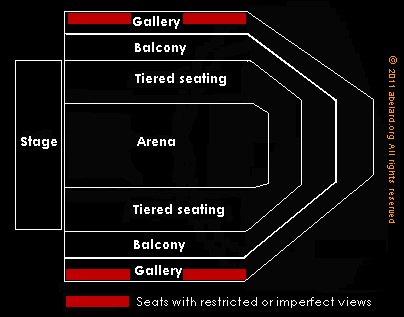
Earl's Court seating plan
Above are photographs of the arena both looking towards
and away from the stage.
- As you see in the text above, the organisers had
budgeted for an optimistic 30,000 paying spectators.
Different newspapers made estimates between 10 and 30,000.
In the end, the doors were opened so more seats could
be filled:
- “...officials shouted "There are plenty
of free seats," and the crowds rushed in.”
Invariably, the organisers will assess numbers to be
far more than the real numbers attending. The police are
not adverse to exaggerating crowd numbers, to enhance
the ‘need’ for ever more police. And newspapers
‘hype’ to draw in readers.
advertisement
bibliography
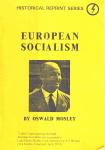 |
European Socialism by Oswald Mosley,
first published June 1951 in the German magazine Nation Europa,
14-page reprint, Steven Books
Historical reprint series
ISBN: 1899435255

Another pamphlet with the same
title:
European Socialism,
published 1956 in Nation Europa
available
online |
|
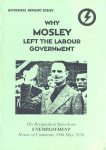 |
Why Mosley left the Labour government - his
resignation speech on unemployment, House of Commons,
28 May 1930
14-page reprint, Steven Books
Historical reprint series
ISBN: 190411056

Response to Mosley’s speech on unemployment
- Unemployment Policy (1930) Committee
UK national government archives
[CAB 24/211 1930]

British Union manifesto, 1938:
Tomorrow
We Live [.pdf] |
|
 |
The Code of the Woosters is included
in The Jeeves Omnibus 1, 1990 Hutchinson,
p.237 - 238
ISBN-10: 009173987X
ISBN-13: 978-0091739874, pbk,
amazon.com / £11.21 [amazon.co.uk] {advert} |
|



|
Wigs on the Green by Nancy Mitford |
£5.04 [amazon.co.uk] {advert}
Penguin, pbk, 2010
ISBN-10: 0141047461
ISBN-13: 978-0141047461

$10.17 [amazon.com] {advert}
Vintage, pbk, 2010
ISBN-10: 0307740854
ISBN-13: 978-0307740854
$13.29 [amazon.com] {advert}
Kindle version: 303 Kb
ePenguin, 2010
ASIN: B003AYZBJS |
|
related documents at abelard.org
end
notes
- Oswald Mosley
(1896 – 1980), English politician who was the
leader of the British Union of Fascists from 1932 to
1940 and of its successor, the Union Movement, from
1948 until his death. These groups were known for distributing
anti-Semitic propaganda, conducting hostile demonstrations
in the Jewish sections of east London, and wearing Nazi-style
uniforms and insignia.
Serving in the House of Commons from 1918 to 1931,
Mosley, as he became ever more extreme, was successively
a Conservative, an Independent, and a Labour Party
member, serving in a Labour ministry in 1929 –
30. In 1931 he tried to form a socialist party but
was defeated for reelection to Parliament. The next
year he founded the British
Union of Fascists, for which some enthusiasm was generated
by his own powerful oratory and by the support of
the newspaper publisher Viscount Rothermere (Daily Mail etc.). Interned after the outbreak of World War II, Mosley was released
in 1943 because of illness. On Feb. 7, 1948, he launched
the Union Movement.
Mosley married in 1920 Lady Cynthia Blanche Curzon
(died 1933), daughter of the 1st Marquess Curzon of
Kedleston; and in 1936 Diana Guinness (née
Freeman-Mitford), daughter of the 2nd Baron Redesdale,
himself a prewar apologist of Nazi Germany. (Redesdale
came to abhor the Nazis while his wife, Sydney, continued
to revere Hitler. This was probably the basis for
a growing rift between the couple). Mosley’s
autobiography, My Life, was published
in 1968.
Enc. Brit., with changes by ab
- Before 1970, British currency
was denominates in pounds, shillings and pence (singular:
penny) £sd or LSD.
One pound, £1
= 20 shillings, 20s or 20/-
= 240 pence, 240d, there being 12d to 1s.
£1 in 1939 would be worth at least £50 in
2011 money.
- That is a complete
lie. See 1936 in the Chronology
above. It is also highly probable that Mussolini was
secretly helping to fund Mosley.
-
- Wigs on the green,
- a colloquial expression (orig. Irish) for coming
to blows or sharp altercation (wigs being liable
to fall or be pulled off in a fray).[OED]
- In this extract, the
character, Eugenia (who was based on Unity Mitford),
was election campaigning, standing on an upturned
washtub.
- Some reference keywords/tags:
- Oswald Mosley,Diana Mitford,Adolph Adolf Hitler,British
Union,National Socialist Party,Fascism,Franco,Mussolini,England,UK,U.K.,[Mosely,Moseley]
|






















